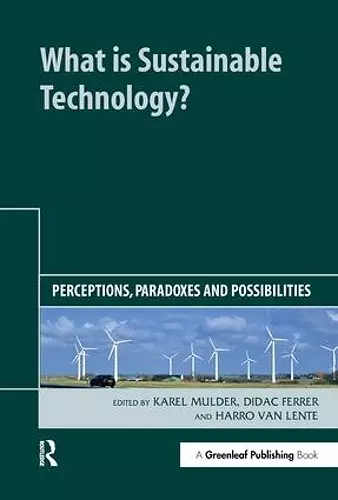What is Sustainable Technology?
Perceptions, Paradoxes and Possibilities
Karel Mulder author Harro van Lente author Didac Ferrer author
Format:Hardback
Publisher:Taylor & Francis Ltd
Published:1st Sep '11
Currently unavailable, and unfortunately no date known when it will be back

The sustainability impact of a technology is often much more complicated and ambivalent than one might expect. This provocative book explores the dilemmas and paradoxes that face today's designers of technology.
Technology has played an significant role in creating sustainability problems that we now face; but it will also play an important role in resolving them. But this does not mean the technological fix will be easy. This book illustrates that the sustainability impact of a technology is often much more complicated and ambivalent than one might expect.
Designers of technology have a major responsibility in the current age. Their designs can have tremendous effects on society, in both the short and the long term. In fact, sustainable development itself has all the characteristics of a design project, albeit a vast one. But a failed product design here will be not just be unsuccessful in the market – it will have far-reaching consequences. It is our common responsibility to make the project successful.
Technology has played an important role in creating the problems that we now face; but it will also play an important role in solving them. But this does not mean the technological fix will be easy. How do we allocate resources and attention when there are myriad issues under the umbrella of "sustainable development" currently in competition with one another? How do we arrive at precise specifications for the sustainable technologies that are to be developed and, furthermore, reach consensus on these specifications? What if our sustainable technological solutions aggravate other problems or create new ones? And, because sustainable development is all about the long-term consequences of our actions, how do we assess the effects of modifying existing landscapes, infrastructures and patterns of life?How could we be sure in advance that the changes that new technologies bring will make our society more sustainable? These dilemmas and paradoxes are the subject of this provocative book.
Sometimes the claim that a technology is sustainable is made in order to make the technology acceptable in the political process, as in the case of nuclear energy production, where the claims of "sustainability" refer to the absence of CO2 emissions. In the case of biofuels, claims of sustainability have led to a "fuel or food" debate, showing that sustainability has counteracting articulations. And the well-known rebound effect is observed when increased resource efficiency can create a stimulus for consumption. What is Sustainable Technology? illustrates that the sustainability impact of...
What is Sustainable Technology? Perceptions, Paradoxes and Possibilities Historically, improving the quality of life has been the main driver for the advent of technology. But the long term effects of new technologies are more often than not unforeseen. And when unwanted side effects of new technologies cause critical damage to our environment, the natural impulse is to turn to other technological developments to replace or reverse the effect of the old ones. Far from being a straightforward process, making technology more sustainable brings to the surface entire sets of problems and paradoxes. Presented in the form of an academic communication session, the bulk of this book comprises a series of case studies all aimed at improving the economic, environmental or social performance of technologies and resource management. An introductory study and a chapter on conclusions frame the eleven studies looking at materials and energy, urbanisation, transport and water management. Acknowledging both the Bruntland Commission definition of sustainability and the vagueness of the term, this volume investigates the complex ways in which different manifestations – or articulations – of sustainability conflict with each other and the way technology is intertwined with economic interests, policy-making, cultural habits or social goals. Can applying the same technology yield completely different and sometimes opposite results? Is it possible that the very process of recycling is damaging to the environment? How long until the end of oil, or the beginning of the hydrogen-fuelled society? These are only a few of the huge number of puzzling questions that scientists and researchers are trying to answer. With its extensive biography and wide range of topics, the book is an excellent introductory read for anyone trying to get the grips of how sustainability works and how technological developments relate to it -- Leonard Bacica, CSR International
ISBN: 9781906093501
Dimensions: unknown
Weight: 521g
264 pages